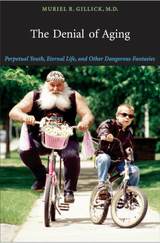
You are old, ill, in pain, and your doctor asks you what you want to do about it. You may be uncertain but you're definitely not alone. By the year 2020, some 50 million Americans will be over sixty-five, and as the nation ages we must all ask what we ought to do about the health and medical care of our elderly. Our response will have profound consequences, not just for individuals and families, but for society as a whole. This book helps us start to form an answer.
To make decisions about medical care in old age, we need to know more about the reality of being elderly and sick, and Choosing Medical Care in Old Age gives us the opportunity. Muriel Gillick, a noted physician who specializes in the care of the elderly and in medical ethics, presents a panoply of stories drawn from her clinical experience. These encounters, with the robust and the frail, the demented and the dying, capture the texture of the experience of being old and faced with critical medical questions. From the stories of older people struggling to make choices in the face of acute illness, stories that are often poignant and sometimes tragic, Gillick develops broad guidelines for medical decision–making for the elderly. Within this framework, she confronts particular concerns and questions. When are certain procedures too burdensome to be justified? What are unacceptable risks? Should family members serve as exclusive spokespersons for relatives who can no longer speak for themselves? Gillick's bold and personal prescription for medical care for the elderly calls for a change in the way medicine is understood and practiced, as well as for changes in the institutions that serve the elderly, such as hospitals and nursing homes. An intelligent and deeply compassionate inquiry into the difficult issues and real–life dilemmas raised by current practices, her book offers a first step toward those changes.

You’ve argued politics with your aunt since high school, but failing eyesight now prevents her from keeping current with the newspaper. Your mother fractured her hip last year and is confined to a wheelchair. Your father has Alzheimer’s and only occasionally recognizes you. Someday, as Muriel Gillick points out in this important yet unsettling book, you too will be old. And no matter what vitamin regimen you’re on now, you will likely one day find yourself sick or frail. How do you prepare? What will you need?
With passion and compassion, Gillick chronicles the stories of elders who have struggled with housing options, with medical care decisions, and with finding meaning in life. Skillfully incorporating insights from medicine, health policy, and economics, she lays out action plans for individuals and for communities. In addition to doing all we can to maintain our health, we must vote and organize—for housing choices that consider autonomy as well as safety, for employment that utilizes the skills and wisdom of the elderly, and for better management of disability and chronic disease.
Most provocatively, Gillick argues against desperate attempts to cure the incurable. Care should focus on quality of life, not whether it can be prolonged at any cost. “A good old age,” writes Gillick, “is within our grasp.” But we must reach in the right direction.
READERS
Browse our collection.
PUBLISHERS
See BiblioVault's publisher services.
STUDENT SERVICES
Files for college accessibility offices.
UChicago Accessibility Resources
home | accessibility | search | about | contact us
BiblioVault ® 2001 - 2024
The University of Chicago Press









